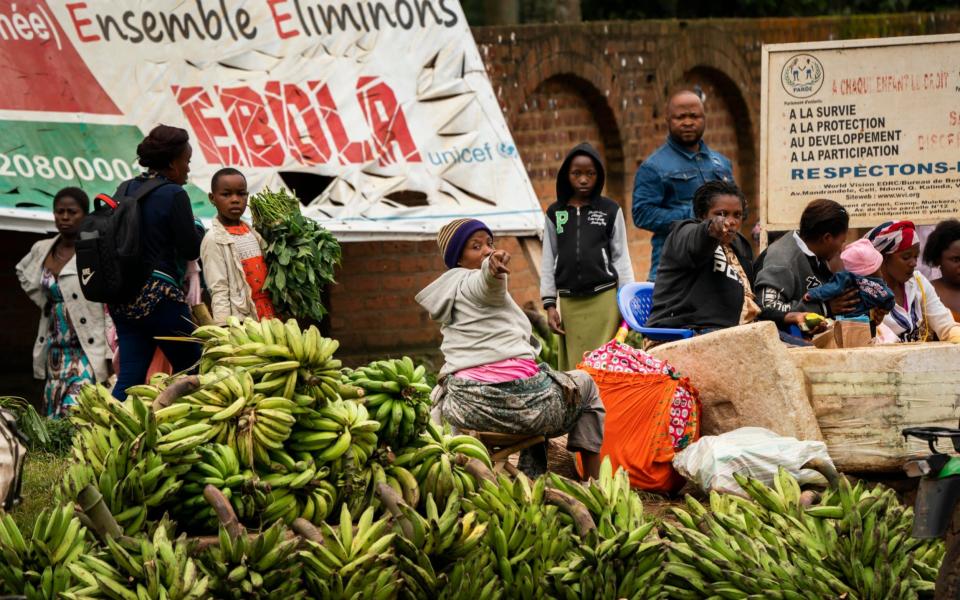'The most complex response we've faced': on the Ebola frontline

On Wednesday, the World Health Organization finally declared that the outbreak of Ebola which has been raging in Democratic Republic of Congo since last August is an international health emergency.
For those who have been battling the crisis on the ground, the declaration means that the world may finally take notice of a disease which has infected 2,500 people, killed 1,600 and shows no sign of slowing down.
Heather Kerr, who works for Save the Children in Democratic Republic of Congo, says this outbreak of Ebola is probably the “most complex response” the charity has ever been involved with and more boots on the ground are desperately needed.
“Dealing with Ebola is very people intensive,” she says, explaining the complicated process of identifying people who are potentially infected.
When someone first presents at a health centre with symptoms of the disease their temperature is taken - high fever is the most obvious sign of the illness, and if that is above the Ebola threshold, the patient is immediately isolated.

The patient is be transferred to a transit centre and tested for the disease. If that test is positive, they are then transferred to a treatment centre, usually next door.
But then the most resource-intensive phase of the response begins: all of the patient’s contacts - and the contacts of their contacts - have to be traced and vaccinated. Then for the next 21 days - the virus incubation period - they will be checked for signs of the disease.
“Some patients might have been in contact with hundreds of people if they’ve been in a crowded market place. It’s a huge and important piece of work,” says Ms Kerr.
Simply getting out to find contacts is hard - the outbreak is taking place in North Kivu, an area of jungle dotted with small communities, and reaching the more remote areas can be difficult. People are also on the move constantly - a patient diagnosed with Ebola may be hundreds of kilometres from home and their contacts.
“The population here is amazingly mobile. People travel long distances in areas of conflict. They cross the borders into Rwanda and Uganda on a daily basis,” says Ms Kerr.
She is currently based in the city of Goma, which saw its first case of Ebola earlier this week. That patient had travelled on a crowded bus from Butembo 300km away, with the bus stopping in three different towns. Authorities say they have traced all the passengers, but it is unclear who else the patient came into contact with on his journey.
The DRC's Ministry of Health had been expecting a case in Goma for months and back in November 3,000 health workers based in the city were vaccinated against the disease as a precaution.

Unfortunately that patient, a pastor, died, but the health clinic he initially presented to in Goma took all the right steps, says Ms Kerr, isolating the patient and informing the relevant authorities.
“There is still resistance from communities who don’t believe that Ebola exists. They think it’s something that’s been brought in from outside or its some kind of witchcraft,” she says. “Goma is a rumour city. Rumours abound. People think they have been poisoned rather than have Ebola.”
Ebola is spread by bodily fluids and one of the key ways to prevent it is simply through good hygiene. Save the Children has installed handwashing stations at major markets and entries into Goma, but the city is a major crossing point - close to the border with Rwanda and on the edge of Lake Kivu - and people are constantly moving in and out.
But the area is also an active conflict zone, which further hinders response efforts. Ms Kerr’s staff have been in lockdown several times and were evacuated over Christmas when the government cancelled elections, sparking days of violence.

WHO has documented 200 attacks on Ebola workers and facilities since Christmas and seven workers have been killed, including two who were murdered in a targeted attack this weekend.
“As a country director my first priority is to keep my staff safe and well,” says Ms Kerr. “They have never come under attack but there have been times when they’ve been out on the road and we’ve heard of fighting ahead so we’ve called them back.”
Ms Kerr worked on the 2014-2016 West Africa Ebola outbreak, which spread across three countries and claimed the lives of 11,000 people. Despite being much smaller in scale she believes the DRC outbreak is much more complex. Most people agree that if it wasn’t for the vaccine - not available in the West Africa outbreak - the number of deaths and cases would be much higher.
“We’re in an area of active conflict and there are so many people on the move all the time, including internally displaced people,” she says.
One of the biggest stumbling blocks is persuading people of the severity of the disease, says Ms Kerr.
“People say they know about Ebola but what they want is peace and security for their family and proper health care. They understand about the disease but it’s not their priority.”
Protect yourself and your family by learning more about Global Health Security

 Yahoo News
Yahoo News 